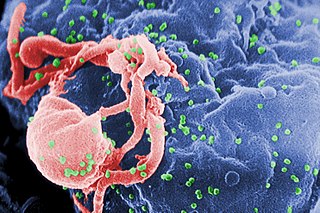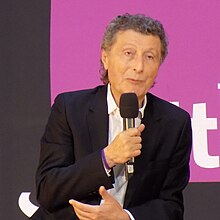Transmissible spongiform encephalopathies (TSEs) are a group of progressive and fatal conditions that are associated with prions and affect the brain and nervous system of many animals, including humans, cattle, and sheep. According to the most widespread hypothesis, they are transmitted by prions, though some other data suggest an involvement of a Spiroplasma infection. Mental and physical abilities deteriorate and many tiny holes appear in the cortex causing it to appear like a sponge when brain tissue obtained at autopsy is examined under a microscope. The disorders cause impairment of brain function, including memory changes, personality changes and problems with movement that worsen chronically.
Immunodeficiency, also known as immunocompromisation, is a state in which the immune system's ability to fight infectious diseases and cancer is compromised or entirely absent. Most cases are acquired ("secondary") due to extrinsic factors that affect the patient's immune system. Examples of these extrinsic factors include HIV infection and environmental factors, such as nutrition. Immunocompromisation may also be due to genetic diseases/flaws such as SCID.

Luc Montagnier was a French virologist and joint recipient, with Françoise Barré-Sinoussi and Harald zur Hausen, of the 2008 Nobel Prize in Physiology or Medicine for his discovery of the human immunodeficiency virus (HIV). He worked as a researcher at the Pasteur Institute in Paris and as a full-time professor at Shanghai Jiao Tong University in China.

AIDS is caused by a human immunodeficiency virus (HIV), which originated in non-human primates in Central and West Africa. While various sub-groups of the virus acquired human infectivity at different times, the present pandemic had its origins in the emergence of one specific strain – HIV-1 subgroup M – in Léopoldville in the Belgian Congo in the 1920s.

Griscelli syndrome is a rare autosomal recessive disorder characterized by albinism (hypopigmentation) with immunodeficiency, that usually causes death by early childhood. Researchers have developed three different classifications of the form of disorder, characterised by different signs and symptoms. Type 1 Griscelli Syndrome is assosciated with severe brain function issues along with distinctive discolouring of the hair and skin. Type 2 Griscelli Syndrome have immune system abnormalities in addition to hypopigmentation of skin and hair. Finally, Type 3 is seen as those only affected by hypopigmentation of the skin and hair. This type is not associated with immune deficiencies or neurological abnormalities.

Pierre Lhomme was a French cinematographer and filmmaker.
Mirko Dražen Grmek was a Croatian and French historian of medicine, writer and scientist. He was one of the pioneers and founders of the history of medicine. His entire opus promotes the historical research of medical knowledge and practices by means of contemporary scientific methods, especially the study of the formation of ideas in specific societies and periods. He put forward the theory of pathocenosis, the coexistence of all diseases in a specific time, place and society.

And the Band Played On is a 1993 American television film docudrama directed by Roger Spottiswoode. The teleplay by Arnold Schulman is based on the best-selling 1987 non-fiction book And the Band Played On: Politics, People, and the AIDS Epidemic by Randy Shilts, and is noteworthy for featuring both a vast historical scope, as well as an exceptionally sprawling cast.
The 9th César Awards ceremony, presented by the Académie des Arts et Techniques du Cinéma, honoured the best French films of 1983 and took place on 3 March 1984 at the Théâtre de l'Empire in Paris. The ceremony was chaired by Gene Kelly and hosted by Léon Zitrone. Le Bal and À nos amours tied for the award for Best Film.

Anne Cuneo was a Swiss journalist, novelist, theatre and film director and screenwriter.
The 14th César Awards ceremony, presented by the Académie des Arts et Techniques du Cinéma, honoured the best French films of 1988 and took place on 4 March 1989 at the Théâtre de l'Empire in Paris. The ceremony was chaired by Peter Ustinov and hosted by Pierre Tchernia. Camille Claudel won the award for Best Film.

Françoise Barré-Sinoussi is a French virologist and Director of the Regulation of Retroviral Infections Division and Professor at the Institut Pasteur in Paris, France. Born in Paris, France, Barré-Sinoussi performed some of the fundamental work in the identification of the human immunodeficiency virus (HIV) as the cause of AIDS. In 2008, Barré-Sinoussi was awarded the Nobel Prize in Physiology or Medicine, together with her former mentor, Luc Montagnier, for their discovery of HIV. She mandatorily retired from active research on August 31, 2015 and fully retired by some time in 2017.
Jean-Claude Chermann is a French virologist who managed the research team which, by 1983, under the administrative supervision of Luc Montagnier, had discovered the virus associated with AIDS. Whereas second author of this initial publication and obviously involved as team manager in this discovery, he had been omitted from the Nobel Prize attributed to its colleagues. In 2008, as chairman of the support committee for the attribution of the Nobel Prize in medicine to Jean-Claude Chermann, Bernard Le Grelle, a political consultant, campaigned for the official recognition of this oversight with the Nobel committee by bringing together more than 700 doctors, professors and scientists . The virus was named lymphadenopathy-associated virus, or LAV. A year later, a team led by Robert Gallo of the United States confirmed the discovery of the virus, but renamed it human T-lymphotropic virus type III (HTLV-III).
The French National AIDS Council is an advisory body established in 1989 with a mission of “to offer its views on the problems faced by society as a result of AIDS and to make useful suggestions to the government”.
Jacques Leibowitch was a French medical doctor and clinical researcher known for his contributions to the knowledge and treatment of HIV and AIDS, starting with his initial designation of a human retrovirus as the cause of AIDS, and his ground-breaking use of triple combination therapy for the effective control of HIV in the patient. A practicing physician in the infectiology department of the Raymond Poincaré University Hospital of Garches, University lecturer Emeritus, he led the treatment program ICCARRE that proposes a dramatic reduction of weekly anti-HIV drug intake, down to 2-3 anti-viral pills a day taken 2 to 3 or 4 days a week, as opposed to the presently recommended seven days a week, as still universally prescribed. These reduced medical dosages are adequate, necessary and sufficient according to the results of his exploratory clinical research carried out since 2003. He is the author of the books "Un virus étrange venu d'ailleurs", and "Pour en finir avec le sida".
HPA-23, sometimes known as antimonium tungstate, is an antiretroviral drug that was used for the treatment of HIV infection. It achieved widespread publicity as an effective treatment for HIV and AIDS beginning in 1984, just one year after HIV was first identified. Later testing failed to demonstrate any efficacy and some patients suffered serious side effects from the drug, including liver failure.
Jérôme Salomon is a French infectious diseases physician and high-ranking civil servant. He is the French Directeur général de la Santé since 8 January 2018. He became known in France since the COVID-19 pandemic.
Bila M. Kapita, M.D. is a doctor from Kinshasa, Democratic Republic of the Congo who aided in initial research efforts investigating HIV/AIDS in Africa in the 1980s and 1990s. Dr. Kapita is credited as one of the first African scientists to independently identify that AIDS was prevalent in Central Africa. Research work in collaboration with Project SIDA helped identify and publicize the heterosexual sexual transmission of HIV. Following his research career, he continued caring for patients with HIV/AIDS and has more recently returned to practicing cardiology.

Jean-Marie Lang was a French doctor and professor of immuno-oncology. He practiced medicine at the Nouvel Hôpital civil in Strasbourg and he was a professor at the University of Strasbourg.








